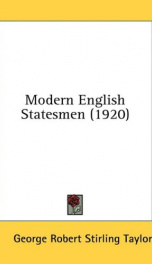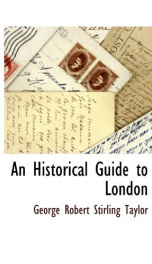modern english statesmen

STATESMEN By G. R. STIRLING TAYLOR NEW YORK ROBERT M. McBRIDE COMPANY 1921 C o p y rig hV, 1921, by M. AdcB ouE S-Ox Printed in the United States of 4-merica Published, 1921 f CONTENTS CHAPTER I STATESMEN AND STATESMANSHIP .... I CHAPTER II OLIVER CROMWELL 27 CHAPTER III THE WALPOLES 76 CHAPTER IV THE PITT FAMILY AND ITS MYTHS I2O CHAPTER V EDMUND BURKE 165 CHAPTER YI BENJAMIN DISRAELI, EARL OF BEACONSFIEL3 . . 2IQ INDEX 263 MODERN ENGLISH STATESMEN CHAPTER I STATESMEN AND STATESMANSHIP IT is one of the unsolved problems of history whether great statesmen rule their country or whether they merely register the desires and opinions of their age, their race and their nation. It is the question whether great men govern or obey. It is no answer to produce a royal proclamation or a chancellors ruling, or even the statute book of an elected parliament. The funda mental mystery still remains, whether any man or parlia ment, however despotic or however wise, has ever made a people do anything that was outside the tradition of the race. It is the problem whether racial or national tra dition is not altogether more powerful than the orders of the most masterful government that ever existed. Did Augustus order the Roman people to obey him as their emperor, or did the united impulse of the republican citizens order Augustus to organize them as an Empire Would it not be near the truth to say that the people of Rome had already made themselves Into a despotism long before they allowed Augustus to act so openly Did the late German Emperor rule the Germans, or did he carry out the imperious will of that race Were they servile to him, or was he servile to them Did Chatham I 2 MODERN ENGLISH STATESMEN force the English people to build an Empire, or did he merely act as their organizing agent Do statesmen ex press their own will, or the will of those who seem to be their subjects The problem is put into the balance almost every time that we weigh a historical fact. The question may never be answered in any absolute way and this for the very good reason that there may be no conclusive answer. It is only the timekeeper and the drill-sergeant who have rigid rules of life. Nature, being neither a pedant nor a bureaucrat, has a happy way of doing the best with each case as it comes along. Some times the autocrat has his will for a time and then the rising of a people will toss him away as easily as a wave tosses a cork. There is a continual giving and taking be tween a people and those who govern them. It is impos sible to make a case for the victory of one side which quite excludes the other. Nevertheless the evidence would seem to point to the ultimate supremacy of national tradition which is national will over the will of the statesman. A governor can survive for a time it may be that for a whole lifetime he may impose his rule against the wishes of his subjects. There are cases where a series of despots have ruled against the will of a race but sooner or later, the racial command pushes its way through the weight of authority above. Nevertheless, the argument again with the uncertain . indecision of Nature once more moves across to the other side, when we have to admit that although a nation usually has the power to overthrow an autocratic statesman be he king or banker yet, since there cannot be cause without effect, the nation that emerges is not quite the same that it would have been had it never been submerged under the STATESMEN AND STATESMANSHIP 3 despotism. To that extent the great autocrats win. But, again, in the final summing up it is probable that the effect of the personal ruler is as the blowing of a con trary wind against an ocean tide it blows the breakers into whiter foam it cannot stop the irresistible flow. A book on statesmen is, after all, merely a book on foam and not on tides. But if they are foam, they are the result of tides and, to that extent, they are symbolic... --This text refers to the Paperback edition.
Info about the book
Author:
Series:
Unknown
ISBN:
0807830534
Rating:
4.5/5 (4)Your rating:
0/5
Languge:
English
Users who have this book
Users who want this book
What readers are saying
What do you think? Write your own comment on this book!
write a commentif you like modern english statesmen try:
Other books by this author
Do you want to read a book that interests you? It’s EASY!
Create an account and send a request for reading to other users on the Webpage of the book!



